Econometric Tools for Macroeconomic Forecasting and Simulation
This research group advances the development and application of quantitative macroeconometric models to improve the accuracy, transparency, and policy relevance of macroeconomic forecasts and simulations. Its work supports the empirical and methodological foundation of the IWH’s forecasting activities and policy recommendations.
The group focuses on both short-term forecasting and simulation-based assessments of long-term economic developments, with particular attention to the interactions between economic activity and the environment. Key areas of expertise include reduced-form models for short-term forecasting, regional disaggregation of macroeconomic trends, structural forecasting techniques, and Dynamic Stochastic General Equilibrium (DSGE) models for scenario analysis.
In addition to its core research, the group develops customized forecasting tools and conducts applied analyses in third-party funded projects. Recent collaborations include model development for Volkswagen Bank, economic ministries in Central Asia (supported by GIZ), the German Environment Agency (UBA), and the EU Horizon 2020 project ENTRANCES, which addresses clean energy transitions in European regions.
By integrating rigorous econometric methods with practical applications, the group contributes to a better understanding of macroeconomic dynamics and enhances the basis for evidence-based policy decisions at national and international levels.
Research Cluster
Economic Dynamics and StabilityYour contact

- Department Macroeconomics
EXTERNAL FUNDING
07.2022 ‐ 12.2026
Evaluation of the InvKG and the federal STARK programme
German Federal Ministry for Economic Affairs and Climate Action
On behalf of the Federal Ministry of Economics and Climate Protection, the IWH and the RWI are evaluating the use of the approximately 40 billion euros the federal government is providing to support the coal phase-out regions..
12.2024 ‐ 02.2026
Macroeconomic Modelling for Energy Investments in Vietnam
Deutsche Gesellschaft für Internationale Zusammenarbeit (GIZ) GmbH
08.2024 ‐ 03.2025
Strengthening Public Financial Management in Vietnam
Deutsche Gesellschaft für Internationale Zusammenarbeit (GIZ) GmbH
01.2023 ‐ 12.2023
Early determination of stable results for gross domestic product or real economic growth and gross value added at federal state level
Landesbetrieb Information und Technik Nordrhein-Westfalen
The project examines whether the accuracy of the first estimate of gross value added and gross domestic product for the federal states can be increased, thereby reducing the extent of subsequent revisions.
01.2018 ‐ 12.2023
EuropeAid (EU Framework Contract)
Europäische Kommission
05.2020 ‐ 09.2023
ENTRANCES: Energy Transitions from Coal and Carbon: Effects on Societies
Europäische Kommission
ENTRANCES aims at examining the effects of the coal phase-out in Europe. How does the phase-out transform society – and what can politics do about it?
This project has received funding from the European Union’s Horizon 2020 research and innovation programme under grant agreement No 883947.
10.2019 ‐ 01.2023
Climate Resilient Economic Development
Climate change has a substantial impact on economic growth and a country’s development. This increases the need for reliable and viable approaches to assessing the impact of climate risks and potential adaptation scenarios. Political decision-makers in ministries of planning and economy need sound forecasts in order to design and finance adequate economic policy instruments and actively to take countermeasures. In the pilot countries (Georgia, Kazakhstan and Vietnam), climate risk is included in macroeconomic modelling, enabling the results to be integrated into the policy process so as to facilitate adapted economic planning. The IWH team is responsible for macroeconomic modelling in Vietnam.
07.2016 ‐ 12.2018
Climate Protection and Coal Phaseout: Political Strategies and Measures up to 2030 and beyond
01.2017 ‐ 12.2017
Support to Sustainable Economic Development in Selected Regions of Uzbekistan
01.2017 ‐ 12.2017
Short-term Macroeconomic Forecasting Model in Ministry of Economic Development and Trade of Ukraine
01.2016 ‐ 12.2017
Development of analytical tools based on Input-Output table
The aim of the project was the development of an analytical tool to assess the gains and losses of possible state programs supporting the development of the private sector of the Tajik economy.
11.2015 ‐ 12.2016
Employment and Development in the Republic of Uzbekistan
Support to sustainable economic development in selected regions of Uzbekistan
05.2016 ‐ 05.2016
Framework and Finance for Private Sector Development in Tajikistan
02.2016 ‐ 04.2016
Macroeconomic Reforms and Green Growth - Assessment of economic modelling capacity in Vietnam
10.2015 ‐ 03.2016
Improved Evidence-based Policy Making - GIZ Tadschikistan
Deutsche Gesellschaft für Internationale Zusammenarbeit (GIZ) GmbH
Refereed Publications
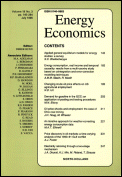
Power Generation and Structural Change: Quantifying Economic Effects of the Coal Phase-out in Germany
in: Energy Economics, 2021
Abstract
In the fight against global warming, the reduction of greenhouse gas emissions is a major objective. In particular, a decrease in electricity generation by coal could contribute to reducing CO2 emissions. We study potential economic consequences of a coal phase-out in Germany, using a multi-region dynamic general equilibrium model. Four regional phase-out scenarios before the end of 2040 are simulated. We find that the worst case phase-out scenario would lead to an increase in the aggregate unemployment rate by about 0.13 [0.09 minimum; 0.18 maximum] percentage points from 2020 to 2040. The effect on regional unemployment rates varies between 0.18 [0.13; 0.22] and 1.07 [1.00; 1.13] percentage points in the lignite regions. A faster coal phase-out can lead to a faster recovery. The coal phase-out leads to migration from German lignite regions to German non-lignite regions and reduces the labour force in the lignite regions by 10,100 [6300; 12,300] people by 2040. A coal phase-out until 2035 is not worse in terms of welfare, consumption and employment compared to a coal-exit until 2040.
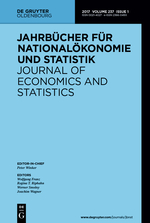
(Since when) are East and West German Business Cycles Synchronised?
in: Jahrbücher für Nationalökonomie und Statistik, No. 1, 2021
Abstract
We analyze whether, and since when, East and West German business cycles are synchronised. We investigate real GDP, unemployment rates and survey data as business cycle indicators and we employ several empirical methods. Overall, we find that the regional business cycles have synchronised over time. GDP-based indicators and survey data show a higher degree of synchronisation than the indicators based on unemployment rates. However, synchronisation among East and West German business cycles seems to have become weaker again recently.
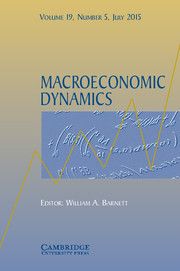
Switching to Good Policy? The Case of Central and Eastern European Inflation Targeters
in: Macroeconomic Dynamics, No. 8, 2020
Abstract
The paper analyzes how actual monetary policy changed following the official adoption of inflation targeting in the Czech Republic, Hungary, and Poland and how it affected the volatilities of important macroeconomic variables in the years thereafter. To disentangle the effects of the policy shift from exogenous changes in the volatilities of these variables, a Markov-switching dynamic stochastic general equilibrium model is estimated that allows for regime switches in the policy parameters and the volatilities of shocks hitting the economies. Whereas estimation results reveal periods of high and low volatility for all three economies, the presence of different policy regimes is supported by the underlying data for the Czech Republic and Poland, only. In both economies, monetary policy switched from weak and unsystematic to strong and systematic responses to inflation dynamics. Simulation results suggest that the policy shifts of both central banks successfully reduced inflation volatility in the following years. The observed reduction in output volatility, on the other hand, is attributed more to a reduction in the size of external shocks.

The Effects of Fiscal Policy in an Estimated DSGE Model – The Case of the German Stimulus Packages During the Great Recession
in: Macroeconomic Dynamics, No. 6, 2020
Abstract
In this paper, we analyze the effects of the stimulus packages adopted by the German government during the Great Recession. We employ a standard medium-scale dynamic stochastic general equilibrium (DSGE) model extended by non-optimizing households and a detailed fiscal sector. In particular, the dynamics of spending and revenue variables are modeled as feedback rules with respect to the cyclical components of output, hours worked and private investment. Based on the estimated rules, fiscal shocks are identified. According to the results, fiscal policy, in particular public consumption, investment, and transfers prevented a sharper and prolonged decline of German output at the beginning of the Great Recession, suggesting a timely response of fiscal policy. The overall effects, however, are small when compared to other domestic and international shocks that contributed to the economic downturn. Our overall findings are not sensitive to considering fiscal foresight.
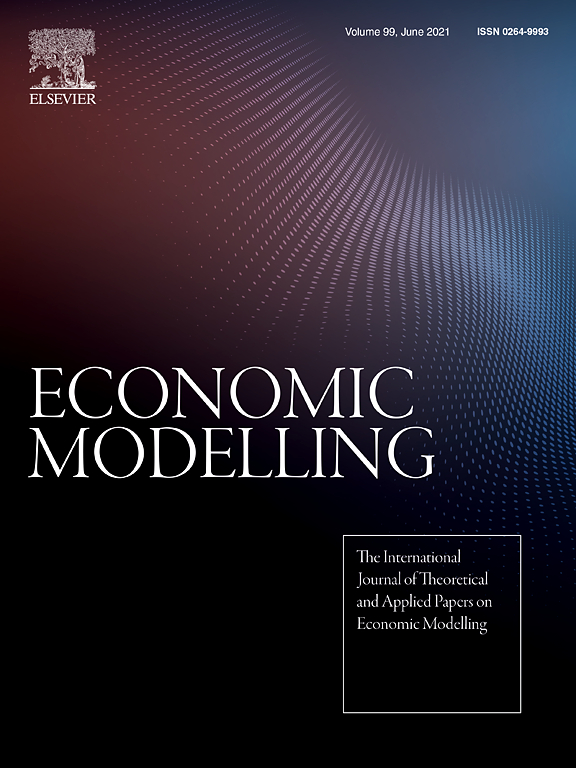
Employment Effects of Introducing a Minimum Wage: The Case of Germany
in: Economic Modelling, July 2020
Abstract
Income inequality has been a major concern of economic policy makers for several years. Can minimum wages help to mitigate inequality? In 2015, the German government introduced a nationwide statutory minimum wage to reduce income inequality by improving the labour income of low-wage employees. However, the employment effects of wage increases depend on time and region specific conditions and, hence, they cannot be known in advance. Because negative employment effects may offset the income gains for low-wage employees, it is important to evaluate minimum-wage policies empirically. We estimate the employment effects of the German minimum-wage introduction using panel regressions on the state-industry-level. We find a robust negative effect of the minimum wage on marginal and a robust positive effect on regular employment. In terms of the number of jobs, our results imply a negative overall effect. Hence, low-wage employees who are still employed are better off at the expense of those who have lost their jobs due to the minimum wage.
Working Papers
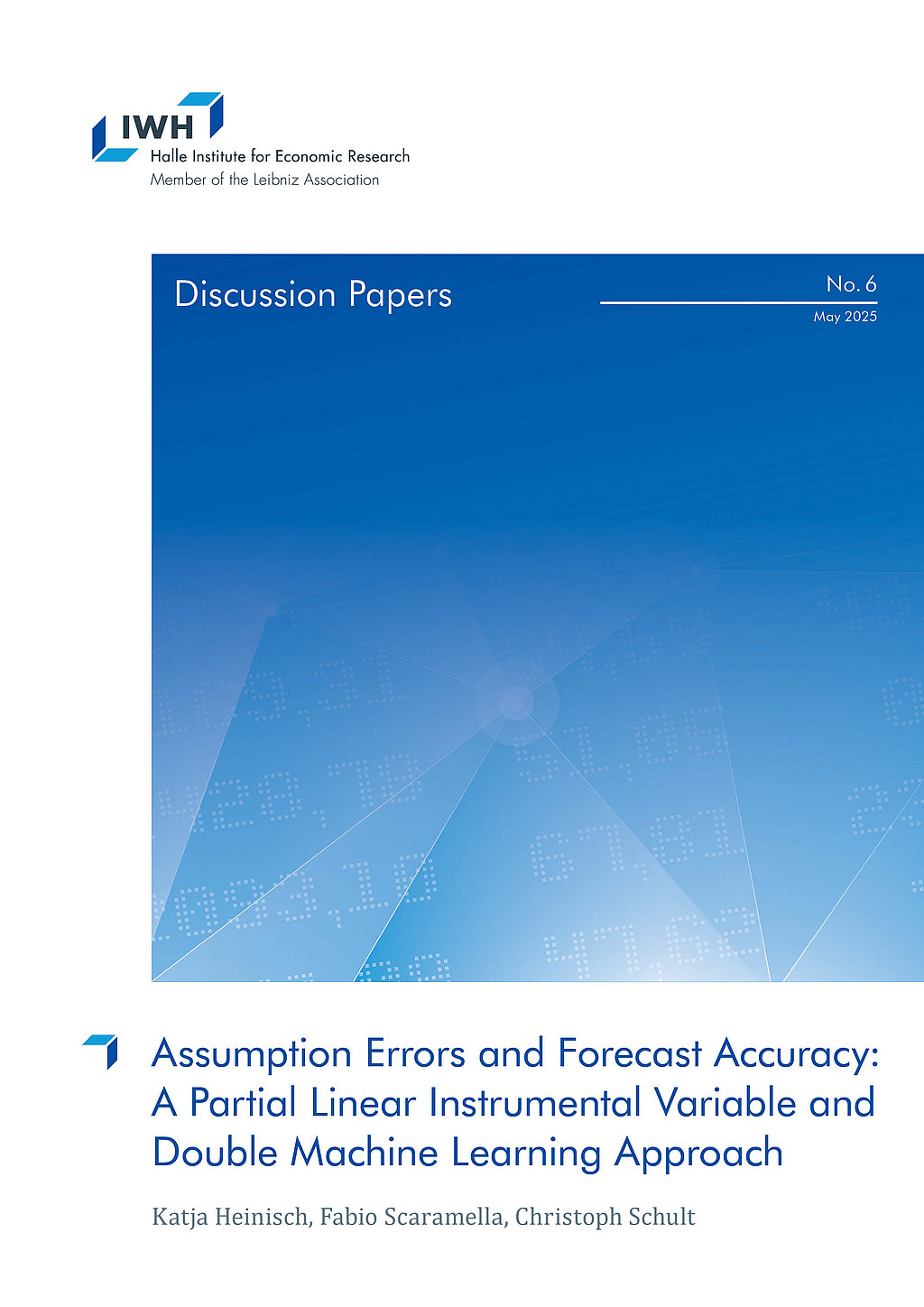
Assumption Errors and Forecast Accuracy: A Partial Linear Instrumental Variable and Double Machine Learning Approach
in: IWH Discussion Papers, No. 6, 2025
Abstract
<p>Accurate macroeconomic forecasts are essential for effective policy decisions, yet their precision depends on the accuracy of the underlying assumptions. This paper examines the extent to which assumption errors affect forecast accuracy, introducing the average squared assumption error (ASAE) as a valid instrument to address endogeneity. Using double/debiased machine learning (DML) techniques and partial linear instrumental variable (PLIV) models, we analyze GDP growth forecasts for Germany, conditioning on key exogenous variables such as oil price, exchange rate, and world trade. We find that traditional ordinary least squares (OLS) techniques systematically underestimate the influence of assumption errors, particularly with respect to world trade, while DML effectively mitigates endogeneity, reduces multicollinearity, and captures nonlinearities in the data. However, the effect of oil price assumption errors on GDP forecast errors remains ambiguous. These results underscore the importance of advanced econometric tools to improve the evaluation of macroeconomic forecasts.</p>

Banks and the State-Dependent Effects of Monetary Policy
in: NBER Working Papers, No. 33523, 2025
Abstract
<p>We show that the response of banks’ net interest margin (NIM) to monetary policy shocks is state dependent. Following a period of low (high) Federal Funds rates, a contractionary monetary policy shock leads to an increase (decrease) in NIM. Aggregate economic activity exhibits a similar state-dependent pattern. To explain these dynamics, we develop a banking model in which social interactions influence households’ attentiveness to deposit interest rates. We embed that framework within a nonlinear heterogeneous-agent NK model. The estimated model accounts well quantitatively for our key empirical findings.</p>
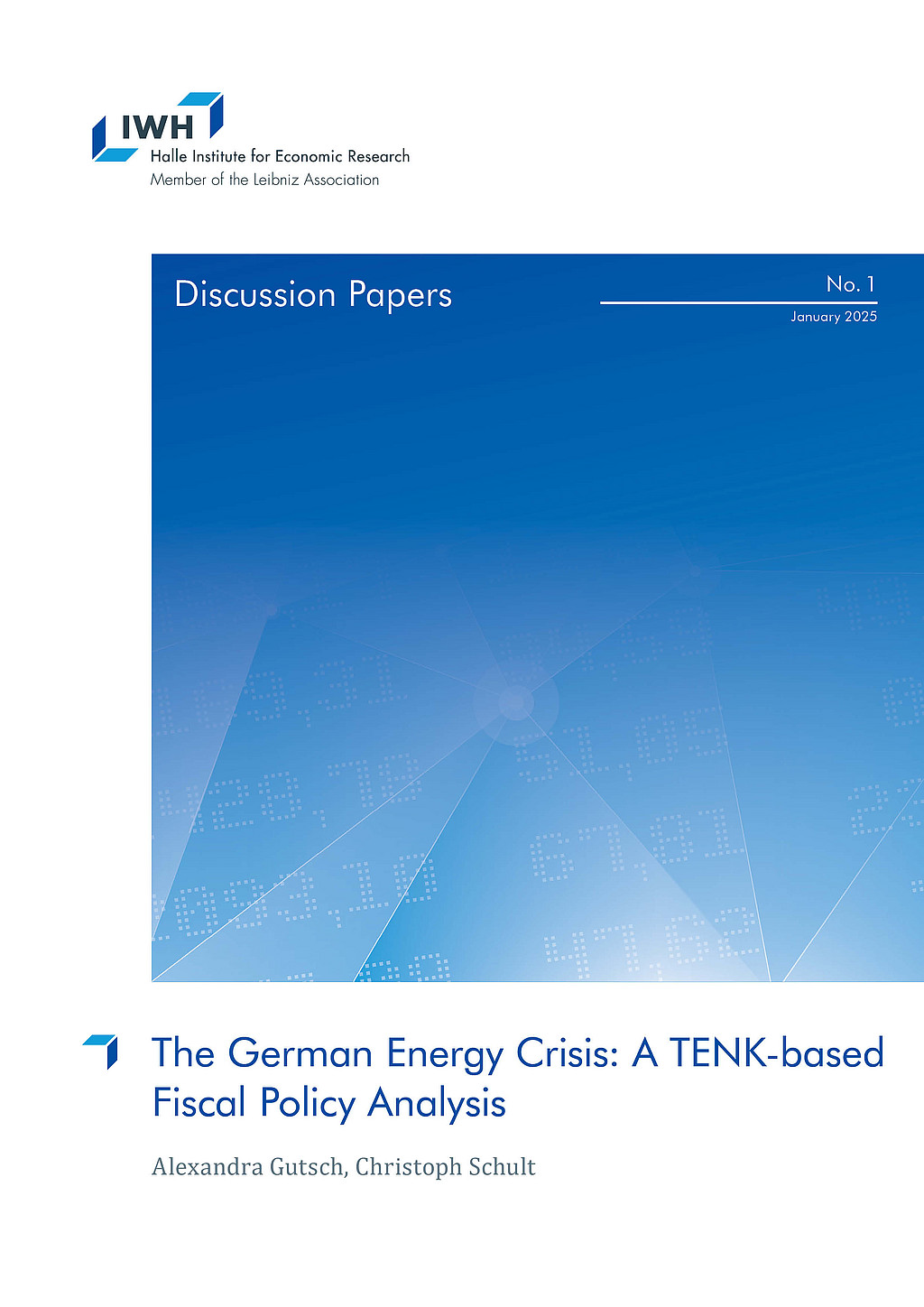
The German Energy Crisis: A TENK-based Fiscal Policy Analysis
in: IWH Discussion Papers, No. 1, 2025
Abstract
<p>We study the aggregate, distributional, and welfare effects of fiscal policy responses to Germany’s energy crisis using a novel Ten-Agents New-Keynesian (TENK) model. The energy crisis, compounded by the COVID-19 pandemic, led to sharp increases in energy prices, inflation, and significant consumption disparities across households. Our model, calibrated to Germany’s income and consumption distribution, evaluates key policy interventions, including untargeted and targeted transfers, a value-added tax cut, energy tax reductions, and an energy cost brake. We find that untargeted transfers had the largest short-term aggregate impact, while targeted transfers were most cost-effective in supporting lower-income households. Other instruments, as the prominent energy cost brake, yielded comparably limited welfare gains. These results highlight the importance of targeted fiscal measures in addressing distributional effects and stabilizing consumption during economic crises.</p>
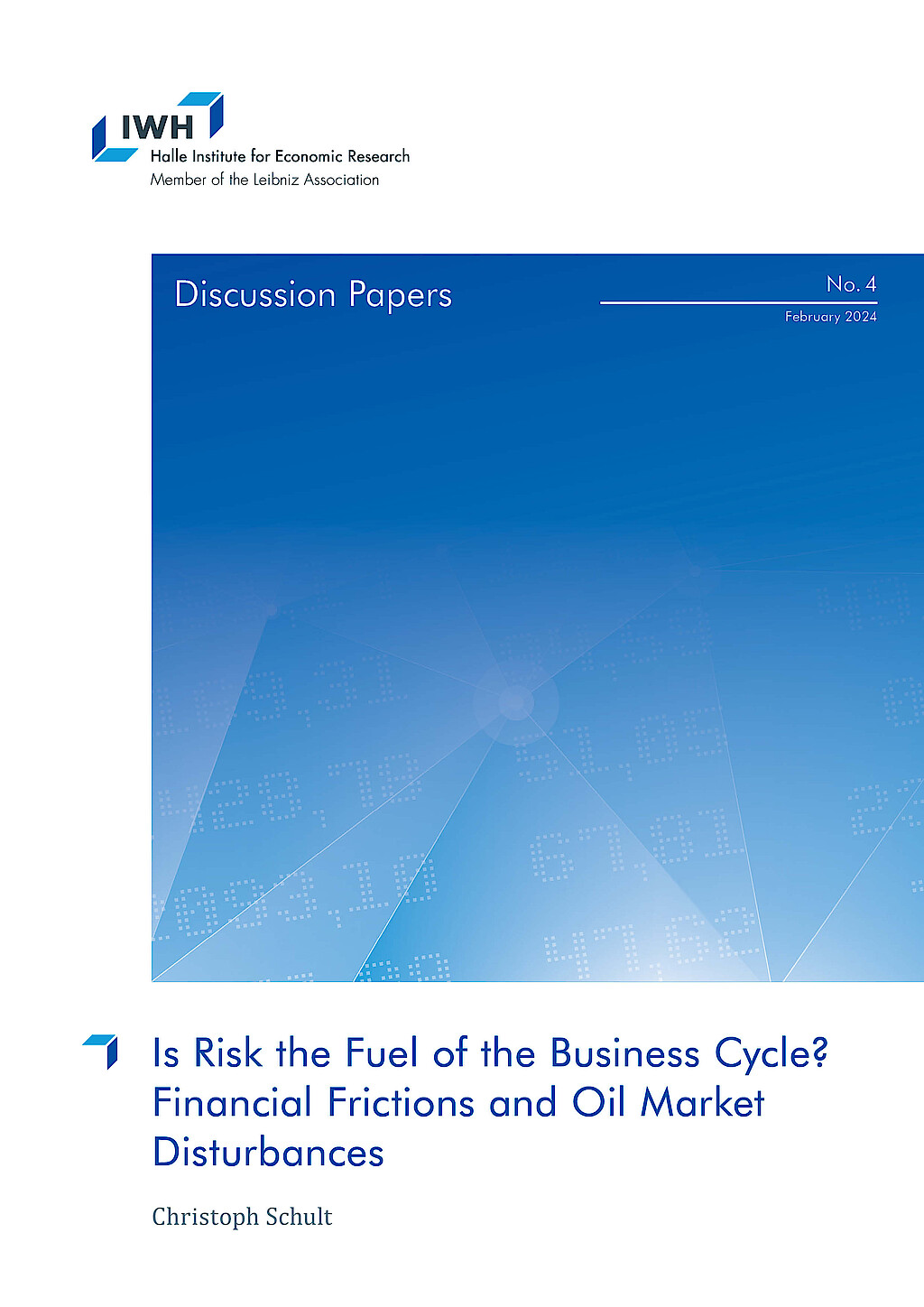
Is Risk the Fuel of the Business Cycle? Financial Frictions and Oil Market Disturbances
in: IWH Discussion Papers, No. 4, 2024
Abstract
I estimate a dynamic stochastic general equilibrium (DSGE) model for the United States that incorporates oil market shocks and risk shocks working through credit market frictions. The findings of this analysis indicate that risk shocks play a crucial role during the Great Recession and the Dot-Com bubble but not during other economic downturns. Credit market frictions do not amplify persistent oil market shocks. This result holds as long as entry and exit rates of entrepreneurs are independent of the business cycle.
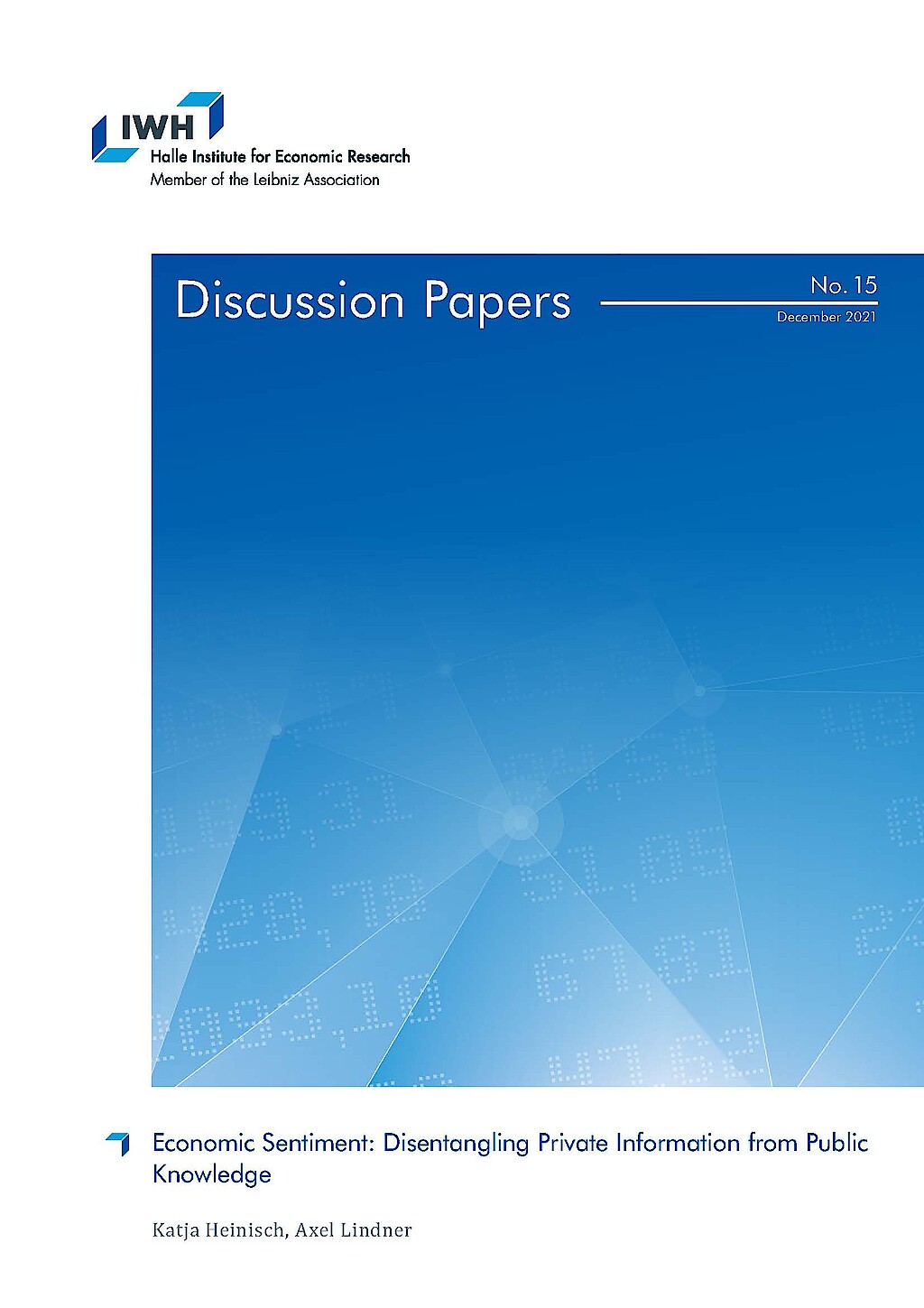
Economic Sentiment: Disentangling Private Information from Public Knowledge
in: IWH Discussion Papers, No. 15, 2021
Abstract
This paper addresses a general problem with the use of surveys as source of information about the state of an economy: Answers to surveys are highly dependent on information that is publicly available, while only additional information that is not already publicly known has the potential to improve a professional forecast. We propose a simple procedure to disentangle the private information of agents from knowledge that is already publicly known for surveys that ask for general as well as for private prospects. Our results reveal the potential of our proposed technique for the usage of European Commissions‘ consumer surveys for economic forecasting for Germany.


























